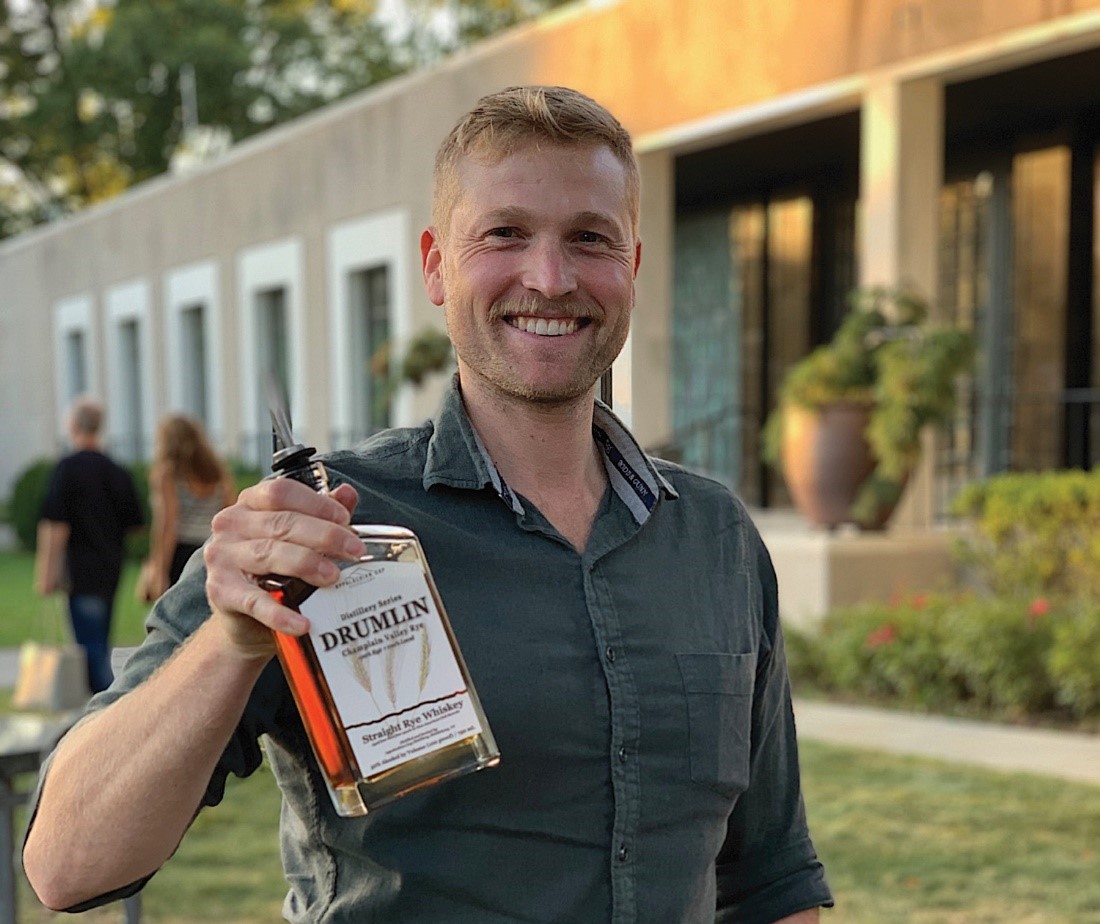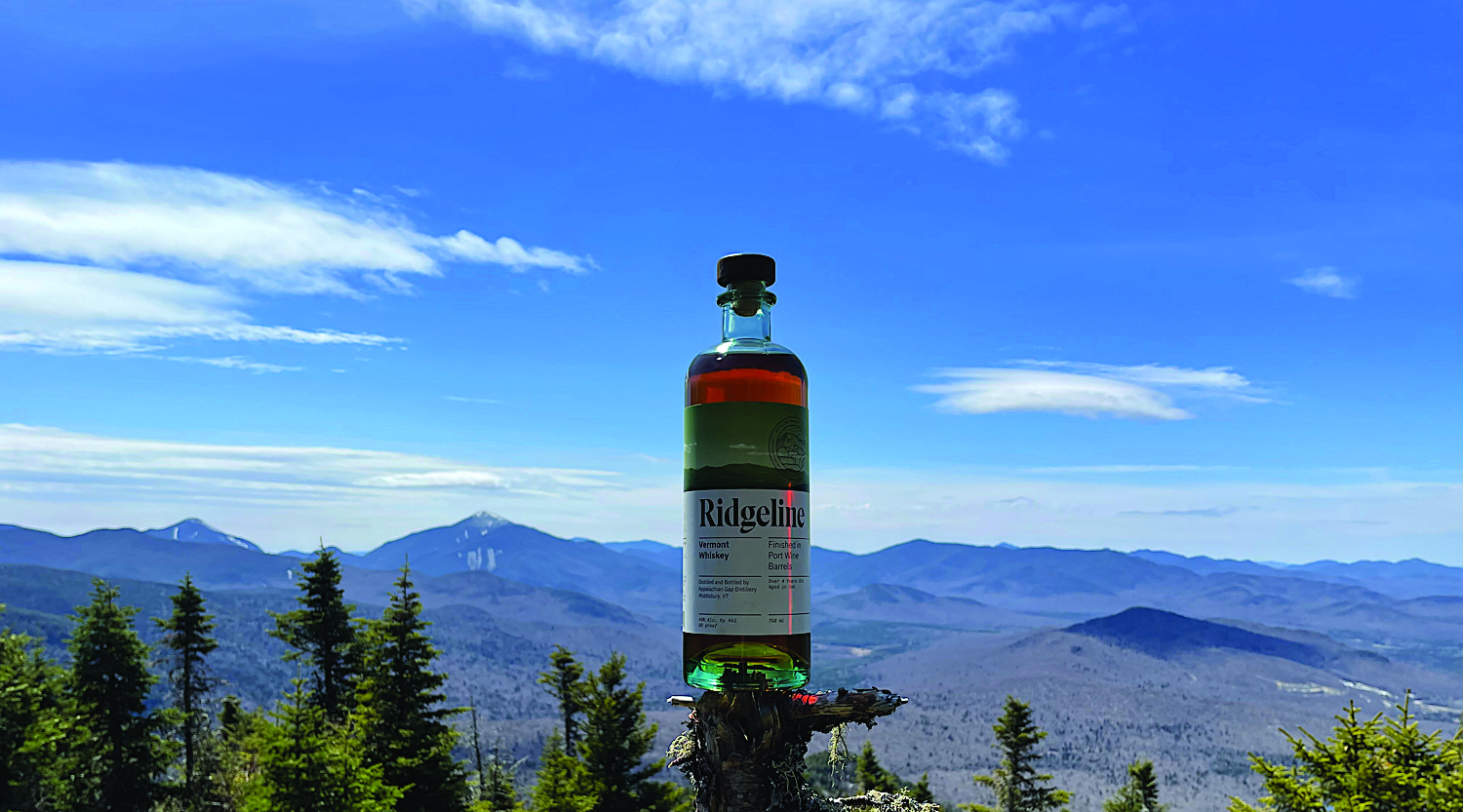There's nothing like a refreshing gin and tonic in the spring. When it gets hot, a margarita hits the spot. When the snow flies, a hot toddy can feel like a warm blanket. But in August, when we're bogged down in the dog days and need just a little pick- me-up, there may be no more perfect spirit than August. A coffee-flavored whiskey produced by Appalachian Gap Distillery, August starts with a mash of 40% barley and 60% corn. It's double distilled — the second time through fresh ground coffee and aged in No. 4 char, new American oak barrels. “It started as something strange and obscure that no one has ever done,” Appalachian Gap Co-Founder Lars Hubbard says. “There are lots of companies out there yelling about how they Appalachian Gap's Ridgeline Whiskey in barrels and bottles, above, and Will Drucker, one of Appalachian Gap's owners, marketing lead and the originator of the distillery's Split Spirits, introduces guests to Drumlin, a Champlain Valley Straight Rye Whiskey. Were the first to have coffee-infused spirits. I usually say, 'excuse me there, fella.'”

Expect a bourbon with a dark roast coffee roundness and a Scotch-like finish with a long, clean burn. At 100 proof, it also has the added benefit of a caffeine kick and a touch of sweetness from the char. “It's a gorgeous sipper,” Hubbard says. “And it makes an interesting Manhattan. The coffee notes are boosted by the vermouth.” August also features something intangible on the mash bill — the influential spirit of August Hed, Hubbard's grandfather, for whom the whiskey was named, and the man whose face is featured on the label. “That's a picture of my granddad,” Hubbard says. “He was a carpenter in Sweden. I have memories of visiting him as a kid. He trained birds to land on him to be fed. He was a magical person with a special place in my heart and in my memories.” It's just one of the creative efforts the team at Appalachian Gap Distillery have crafted. A visit to the distillery gives guests a chance to sample the team's diverse handiwork while looking out through a bank of windows that watch over the Middlebury production floor. Appalachian Gap's Ridgeline Vermont Whiskey, the distiller's bestseller, delivers influence from both classic bourbon and Irish whiskeys but has its own unique character. It opens with crisp autumn fruits and leads to flavors of dried fruit, vanilla, and notes of leather and tobacco “like a fine old red wine” (thanks to a finishing technique in port wine barrels).
What is it that keeps co-founders Hubbard, Chuck Burkins and the support system/voice of reason Robin Hubbard constantly reimagining and trying new things? Blame it on an insatiable curiosity. “Like many distillers, on some level I'm a mad scientist,” Hubbard says. “We have our base products, and in order to keep my brain active we'll play around with other things.” And while they hope people like their spirits, it's not necessarily a be-all, end-all litmus test. If the team likes it and believes in it, that might be enough. One of Appalachian Gap's first spirits was another coffee-infused spirit called Kaffekask — a white whiskey with a corn whiskey sweetness and an earthy dark roast coffee note. It smells like coffee tastes, is delicious out of the freezer or in an espresso martini and provides a new take on a Negroni. The founders loved it. But as expressed on the distillery's website: “Some you win, some you lose, some get rained out. It sold like a truckload of rotting salmon.” Still, it has fans that will drive across multiple states to drink it.
Similarly, Papilio, an agave-maple spirit, has captured the palates and imaginations of many adherents. It's an utterly unique combination of Vermont dark maple syrup and agave. Rather than just add maple syrup to a base, Appalachian Gap decided to ferment agave syrup and maple syrup together, creating the first Vtquila. For Hubbard and team, it's a combination of flavors that made perfect sense. “There are notes of smokiness to maple syrup, and notes of smokiness in agave,” Hubbard says. “It made sense to combine them, so we did.” Organic blue agave nectar from Jalisco, Mexico, is imported and mixed at a four-to one ratio with dark maple syrup. A 3-4 week fermentation and double distillation through a hybrid still results in a truly singular spirit: muted tequila flavor overlaid with smoky-sweet notes of maple syrup. The flavors are delicate and work well sipped or as a mixer. “Papilio sits on the shelves at restaurants, and the normal consumer doesn't buy a ton of it,” Hubbard says. “When you make weird stuff , they might not understand it and buy it. They have to taste it to 'get it.' We can deal with that. It's a choice we made a long time ago." “It's actually become our ethos,” Hubbard says. “We make things we like and hope other people like them. We didn't start this business to make or sell or buy bourbon or gin and then flog it. We're doing it in a way that makes us happy. We concentrate on things being delicious. We're not slavishly devoted to an 80/20 bourbon. Right now we're making a ‘wheated’ bourbon fairly high in wheat. We want something that'll sit in the barrel and have some real legs about it. We do it our way. That's the approach we take.”
Nordic Notes Many of the spirits produced at Appalachian Gap Distillery have a distinctly Vermont character to them — but a slightly closer inspection reveals that in some cases the inspiration is inventively Nordic. App Gap's Kaffekask is a delicious white whiskey distilled through fresh ground coffee. It was inspired by a Swedish folk tradition that goes like this: “Place a coin in the bottom of a coffee cup. Fill the cup with enough coffee to make the coin disappear. Add spirits until the coin re-appears. Drink. Repeat as necessary.”
Serious About Sustainability, AppGap Goes Climate Neutral Beating a self-imposed challenge by six months, Appalachian Gap Distillery has become the first distillery in the country to achieve climate neutrality, off setting its carbon footprint entirely. The distillery announced last January that it planned to achieve climate neutrality by the end of 2021. Instead, it reached the milestone six months early. The designation was certified by the nonprofit organization, Climate Neutral. “Lots of businesses green-wash themselves,” Hubbard says. “I thought, 'let's not just make claims. Let's get evaluated and put it on paper.'” It's the latest win in an ongoing sustainability eff ort the distillery has undertaken since it was founded. “Sustainability has been a priority from the beginning,” Co-Founder Lars Hubbard says. “I believe in heart of hearts that it's what we should do. We decided we needed to walk the walk, not just talk the talk.” During the process, Appalachian Gap's entire supply chain was evaluated. “It ended up that we had a little carbon to off set, and it only cost a few hundred dollars to close the loop on things we had been doing, so we did that,” Hubbard says. The plan going forward is to produce an annual sustainability report. It will identify what was done right and what processes can be improved. “It will set a bar that other people should be trying to reach,” Hubbard says. “It doesn't take a lot of effort to do things right. It may take a little money, but if you run your business right, that's not a lot.”


